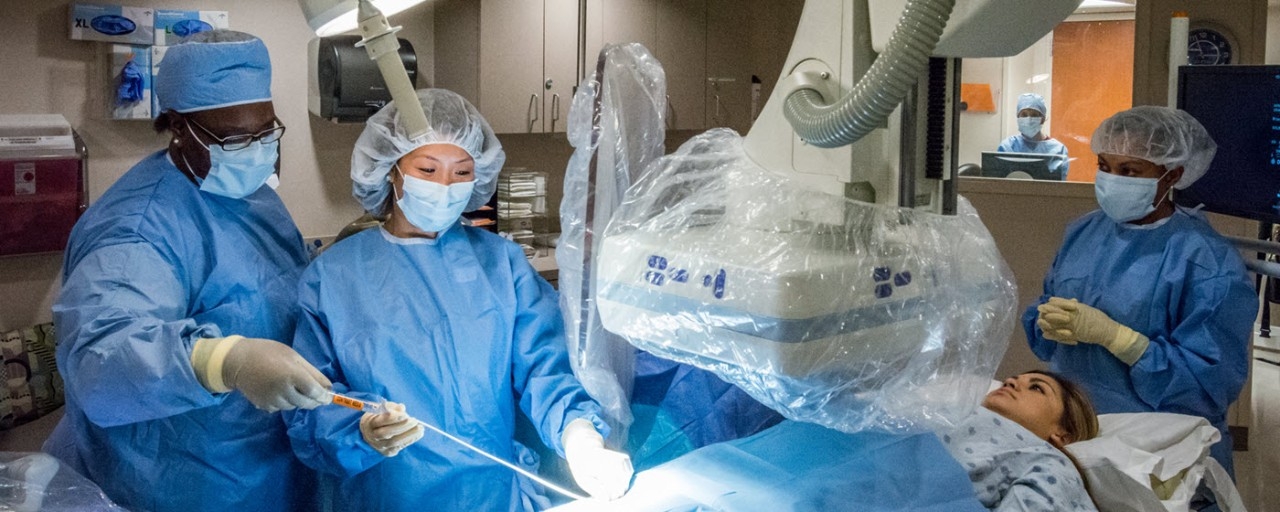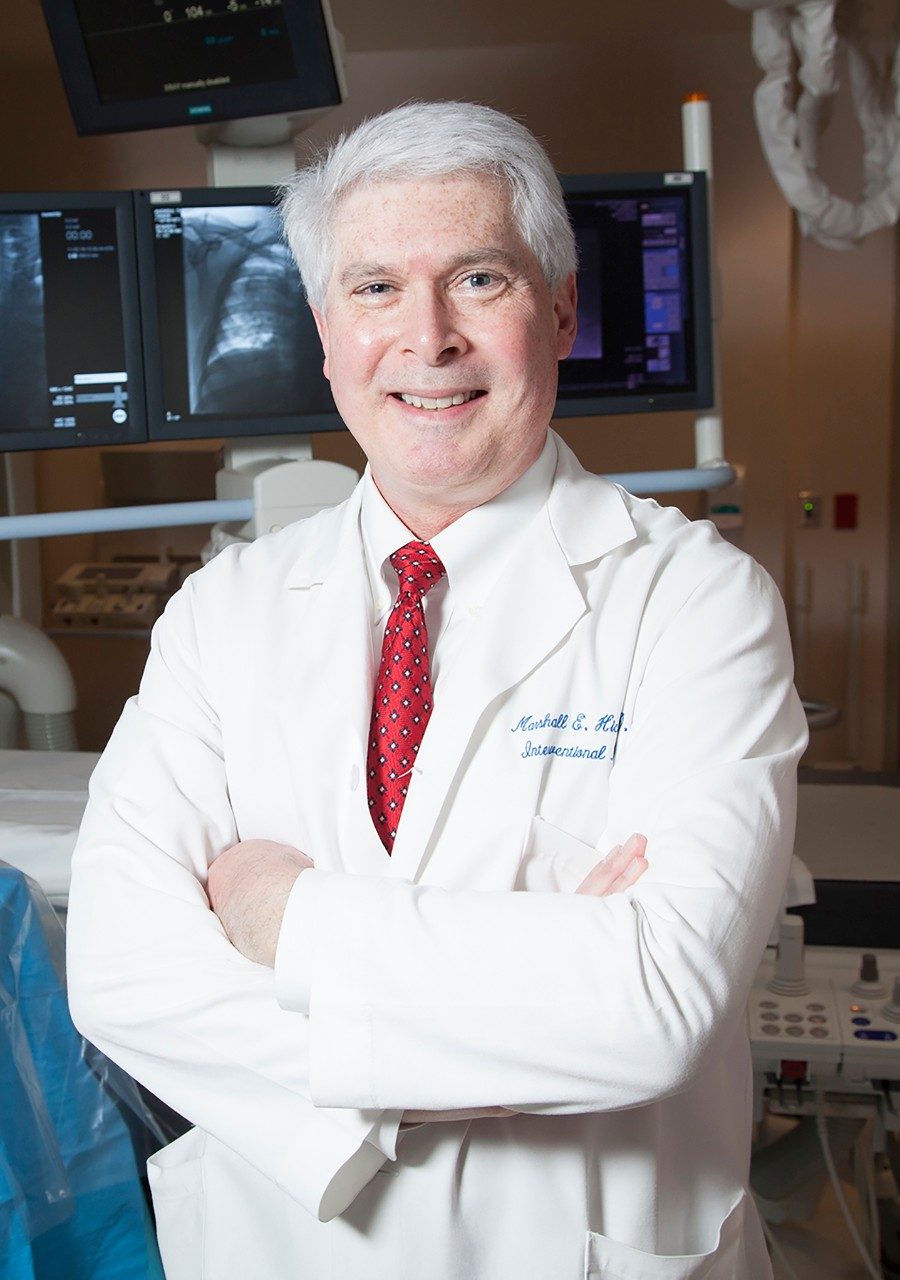
Diagnostic Imaging
Marshall Hicks, M.D.
Division Head
- Departments, Labs and Institutes
- Departments and Divisions
- Diagnostic Imaging Division

The Diagnostic Imaging division is composed of a dedicated team of healthcare professionals focused on delivering high-quality patient care, advancing research, and providing educational programs for our patients, the institution and the broader community. Our locations span the greater Houston metropolitan area, including the Texas Medical Center, League City, Sugar Land, West Houston and The Woodlands.
Our team includes over 200 faculty members across nine academic departments: Abdominal Imaging, Breast Imaging, Cancer Systems Imaging, Imaging Physics, Interventional Radiology, Musculoskeletal Imaging, Neuroradiology, Nuclear Medicine and Thoracic Imaging. Our radiologists utilize over a dozen technologies to identify, diagnose and treat cancer as well as assess response to systemic and local therapies.
Our researchers are given the opportunity and support to perform hypothesis-driven investigations and test new theories that can yield breakthroughs that transform the lives of our patients and advance medical practice. From the first spark of an idea to its translation in our world-leading clinics, our research teams remain invested and determined in our collective focus to end cancer.
Our educational programs are designed to cultivate the next generation of leaders in imaging. We offer comprehensive residency and fellowship opportunities that provide in-depth training in various imaging modalities and subspecialties. Residents and fellows gain hands-on experience with cutting-edge technologies and techniques, guided by our expert faculty across multiple departments.
We invite you to explore our website to discover the numerous ways our team impacts patient care, both directly and indirectly.
Patients
Do you have questions about diagnostic imaging procedures?
Clinical Trials at MD Anderson
Diagnostic Imaging Education and Training
Diagnostic Imaging Specialized Fellowship Programs
Body Imaging Fellowship: Provides training in cross-sectional oncologic imaging, including CT, MRI, PET and ultrasound.
Breast Imaging Fellowship: Clinical experience in screening and diagnostic mammography, breast MRI, breast ultrasound, breast pathology and interventional procedures. Applications for this fellowship are accepted beginning in July of each year.
Musculoskeletal Radiology: MD Anderson Cancer Center and two other Texas Medical Center hospitals accept two individuals for a one-year fellowship that offers extensive clinical and academic research experience in an integrated program.
Neuroradiology/Head & Neck: This educational program is for the second-year neuroradiology fellow interested in a dedicated year at MD Anderson for a comprehensive educational and research program of imaging for brain, spine, and head and neck tumors, including advanced imaging techniques.
Thoracic Oncologic Imaging: One individual per year is chosen for a one-year fellowship with extensive clinical experience in thoracic radiography, CT, MRI, and PET/CT, as well as an optional month of CT and US guided biopsies.
Vascular & Interventional Radiology: In this one-year program with rotations through three Texas Medical Center hospitals, trainees gain experience in several interventional applications, including angioplasty/stent, arteriograms, drainages, uterine artery embolization, chemoembolization, radiofrequency ablation, biopsies and brachytherapy.
Additional fellowship program information may be found on MD Anderson's Graduate Medical Education site.
Physician-Scientist Advanced Scholar Program
The Physician-Scientist Advanced Scholar training program in Oncologic Imaging at The University of Texas MD Anderson Cancer Center pairs enthusiastic and talented young physician-scientists with established faculty mentors for an intensive two- to three-year experience specifically designed to promote innovative and transformative research in the field of oncologic imaging and therapy.
The research experience is customized to match the interest and expertise of the applicant. At the end of the program, these physician-scientists are well poised to compete for NIH Grants and Funding such as K01s (Mentored Research Scientist Development Award) and K99s (Pathway to Independence Award) as they enter into an assistant professor position.
Research Residency Program
The Division of Diagnostic Imaging (DI) at The University of Texas MD Anderson Cancer Center has partnered with the Diagnostic Radiology Residency Programs at Baylor College of Medicine (BCM) and The University of Texas Health Science Center at Houston (UTH) to develop a research-focused program for radiology residents. Known as the “Research Residency Pathway”, such a program supports the research mission of MD Anderson Cancer Center and provides a path for developing future physician-scientists, specifically in the field of oncologic imaging.
Imaging Physics Educational Opportunities
Medical Physics Graduate Program: Our CAMPEP-accredited Medical Physics Graduate Program offers the Specialized Master of Science degree and the Master of Science and Doctor of Philosophy degrees through The University of Texas Graduate School of Biomedical Sciences at Houston.
Imaging Physics Clinical Residency Program: Our CAMPEP-accredited Residency Program in Diagnostic Imaging Physics is a two-year clinical training program for medical physicists who intend to work in diagnostic imaging physics. We also offer a hybrid program, combining two years of postdoctoral research with the two-year residency training program. Both the residency and the hybrid program meet the clinical experience requirements of the American Board of Radiology for board certification.
Postdoctoral Fellowship in Translational Cancer Nanotechnology: The goal of this program is to train scientists who will transfer the great promise of nanotechnology into clinical reality. This novel training program educates future leaders in the broad field of nanotechnology with specific interests in cancer-related applications, who are keenly aware of the needs and demands of clinical environment as well as of major challenges of translational research.
Postdoctoral Fellowships: Postdoctoral Fellowship opportunities are offered for talented scientists to enhance their research skills by collaborating with an individual faculty member to work on specific funded research projects for terms of up to five years.
For more information about the Imaging Physics department's educational opportunities, please contact Melissa Tovar at mtovar@mdanderson.org.
Contact us
Referring and scheduling
For information on referring a patient to MD Anderson, visit our Refer a Patient page.
New patients without a referral should visit our appointments page.
New patients who have an imaging referral from an outside health care provider to MD Anderson should call 713-792-7171.
Existing patients who need to schedule or reschedule imaging exams should call their home clinic or care center.
International referrals
The International Center has dedicated staff with global experience to help ease the referral process for international physicians and patients. Contact the International Center at 001-713-745-0450 or via email at international@mdanderson.org.
